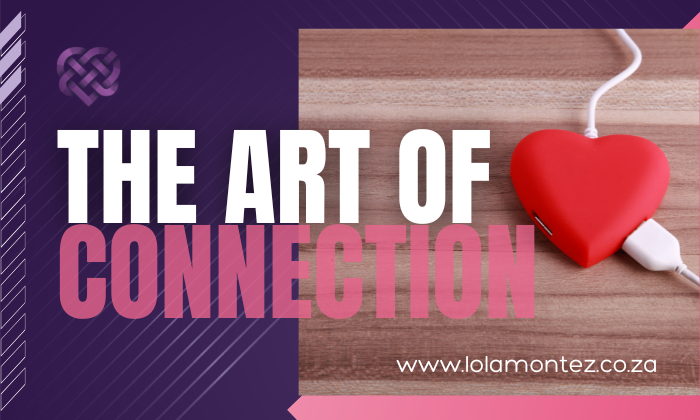The Art of Connection: How to Enhance Communication
with Your Partner
The art of connection – how to enhance Communication with your partner. Effective communication is the cornerstone of a healthy and fulfilling relationship. Whether it’s a romantic partnership, a familial bond, or a friendship, the ability to communicate openly and honestly can strengthen your connection, foster mutual understanding, and resolve conflicts more effectively. Here are several strategies to enhance communication skills in your relationship.
- Active Listening
Active listening is one of the most critical components of effective communication. It involves fully concentrating, understanding, responding, and then remembering what the other person has said. Here’s how you can practice active listening:
- Give Your Full Attention: Put away distractions like phones or televisions when having a conversation. Make eye contact and nod or use verbal affirmations like “I see” or “I understand” to show that you’re engaged.
- Reflect and Paraphrase: Repeat back what the other person has said in your own words. This shows that you’re listening and helps to clarify any misunderstandings.
- Don’t Interrupt: Allow the other person to finish speaking before you respond. This shows respect and helps avoid miscommunications.
- Express Yourself Clearly
Clear communication involves articulating your thoughts and feelings honestly and directly. Here are some tips:
- Use “I” Statements: Instead of saying “You always” or “You never,” frame your thoughts in terms of how you feel. For example, “I feel hurt when…” This reduces defensiveness and focuses on your feelings rather than blaming the other person.
- Be Specific: Avoid vague statements. Instead of saying, “You’re being difficult,” try, “When you cancel plans at the last minute, it makes me feel unimportant.”
- Stay on Topic: Avoid bringing up past issues that aren’t relevant to the current discussion. Focus on resolving the issue at hand.
- Nonverbal Communication
Nonverbal cues, such as body language, facial expressions, and tone of voice, play a significant role in communication. Here’s how to ensure your nonverbal communication aligns with your words:
- Maintain Eye Contact: This shows that you’re interested and engaged in the conversation.
- Mind Your Body Language: Open body language, such as uncrossed arms and leaning slightly forward, can make you appear more approachable and receptive.
- Watch Your Tone: The tone of your voice can convey a lot of emotion. Strive for a calm and respectful tone, even when discussing difficult topics.
- Empathy and Understanding
Empathy involves putting yourself in the other person’s shoes and understanding their feelings and perspectives. Here’s how you can cultivate empathy:
- Acknowledge Their Feelings: Let the other person know that you recognize their emotions. For instance, “I can see that you’re really upset about this.”
- Ask Open-Ended Questions: Encourage the other person to share more about their thoughts and feelings by asking questions like, “How did that make you feel?” or “What do you think about…?”
- Validate Their Experience: Show that you understand and accept their feelings, even if you don’t necessarily agree. For example, “I understand why you felt that way.”
- Conflict Resolution
Conflicts are inevitable in any relationship, but they don’t have to be destructive. Effective conflict resolution involves:
- Stay Calm: Take a deep breath and try to remain calm. If things get too heated, it’s okay to take a break and revisit the conversation later.
- Focus on the Issue, Not the Person: Attack the problem, not the person. Avoid name-calling or making personal attacks.
- Seek Compromise: Be willing to give and take. Finding a middle ground that satisfies both parties can be more beneficial than winning an argument.
- Regular Check-Ins
Regularly checking in with each other can help maintain and improve communication over time. Consider these practices:
- Set Aside Time: Make a habit of setting aside regular time to talk about your relationship. This could be a weekly or monthly check-in.
- Discuss Goals and Expectations: Talk about your goals, expectations, and any concerns you might have. This keeps both parties on the same page and can prevent misunderstandings.
- Celebrate Successes: Acknowledge and celebrate when communication is going well. Positive reinforcement can encourage continued good practices.
- Seek Professional Help if Needed
Sometimes, improving communication in a relationship requires professional help. Couples therapy or counseling can provide a safe space to explore communication issues and develop better strategies with the guidance of a trained professional.
Conclusion
Improving communication skills in your relationship requires effort, practice, and a willingness to adapt. By actively listening, expressing yourself clearly, paying attention to nonverbal cues, practicing empathy, resolving conflicts effectively, regularly checking in, and seeking professional help when needed, you can build a stronger, more understanding, and more fulfilling relationship. Remember, communication is a two-way street, and both parties need to be committed to fostering an open and honest dialogue.

